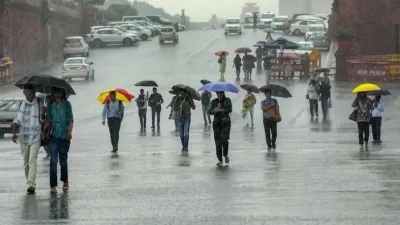Delhi-NCR Cold Wave alert comes as parts of the region experienced light rainfall on Monday morning, bringing temporary relief from dryness but paving the way for a significant drop in temperature. The India Meteorological Department (IMD) has issued an intense cold wave warning for the upcoming days, coupled with a yellow alert for dense fog. As temperatures plunge, residents are bracing for a challenging week ahead amidst worsening air quality.
Delhi’s Weather Takes a Chilling Turn
The onset of light rain in Delhi and NCR has already contributed to colder weather, with experts predicting even harsher conditions. IMD’s yellow alert indicates a high probability of dense fog over the next two days, which could severely disrupt visibility and daily activities. The department has urged commuters to exercise caution on the roads, especially during the early morning and late evening hours.

Focus on Delhi-NCR Cold Wave
The cold wave warning highlights the meteorological shift in Delhi’s weather, with temperatures expected to dip drastically in the coming days. IMD officials suggest that this cold wave may be one of the season’s harshest, affecting not only the national capital but also surrounding regions in Haryana, Punjab, and Uttar Pradesh.
The minimum temperature in parts of Delhi has already touched 6 degrees Celsius, with forecasts indicating a further decline. The IMD has emphasized the need for warm clothing, especially for children and the elderly, who are most vulnerable to cold weather-related ailments.
Air Quality Woes Persist
Amid the weather warnings, Delhi’s air quality remains a pressing concern. The Air Quality Index (AQI) on Monday was recorded at 410, placing it firmly in the “severe” category. The combination of cold weather and poor air quality is expected to exacerbate respiratory issues among residents. Health experts have advised the use of air purifiers and masks, alongside avoiding outdoor activities during peak pollution hours.
The IMD has stated that the rain may bring temporary improvement in air quality due to the settling of dust particles. However, this respite is likely to be short-lived as stubble burning in neighboring states and urban emissions continue to contribute to the pollution crisis.
Impact on Daily Life
The cold wave and accompanying fog are expected to significantly impact daily life in Delhi-NCR. Transportation networks, including flights, trains, and road traffic, are likely to face disruptions. Several flights have already been delayed due to low visibility at the Indira Gandhi International Airport. Railway services have also reported delays, with dense fog obstructing smooth operations on key routes.
Additionally, schools and offices are bracing for attendance disruptions as residents struggle to navigate the chilly mornings. Many schools have revised their timings to accommodate the adverse weather, and businesses are offering remote working options where possible.

Precautions Against Cold Wave
Authorities have issued several advisories to help residents combat the cold wave effectively:
- Layered Clothing: Wear multiple layers of warm clothing to retain body heat.
- Stay Indoors: Avoid unnecessary outdoor activities, particularly early in the morning and late at night.
- Use Heating Appliances: Ensure the safe use of heaters to maintain a comfortable indoor temperature.
- Consume Warm Beverages: Include hot soups, herbal teas, and warm water in your daily routine to stay hydrated and warm.
- Emergency Preparedness: Keep emergency contact numbers handy in case of health issues or accidents caused by slippery roads.
Historical Cold Waves in Delhi
Delhi has a history of experiencing intense cold waves during December and January. In 2019, the city recorded its coldest December in over a century, with the temperature dropping to 2.4 degrees Celsius. Similarly, the winter of 2021 saw multiple cold waves that disrupted life in the region.
These events underline the importance of preparing for extreme weather conditions, especially as climate change continues to influence seasonal patterns. Experts argue that proactive measures, such as improving urban infrastructure and enhancing public awareness, are critical to mitigating the impact of cold waves.
Public Sentiment and Government Response
The current weather situation has sparked widespread discussions on social media. Residents have expressed concerns about coping with the cold wave, particularly in light of the ongoing air quality crisis. Several users have called for stricter government action to tackle pollution and provide relief measures for vulnerable populations.
The Delhi government has announced initiatives to support residents during the cold wave, including distributing blankets to homeless individuals and setting up night shelters equipped with heaters. The municipal authorities are also intensifying their efforts to combat pollution through measures like deploying anti-smog guns and sprinkling water on roads.
Hope for Seasonal Recovery
While the Delhi-NCR Cold Wave poses significant challenges, residents remain hopeful for a seasonal recovery in January. Meteorologists predict that the cold wave may subside after the first week of January, bringing relatively milder weather conditions. Until then, staying informed and taking preventive measures will be crucial for navigating the intense cold spell.

